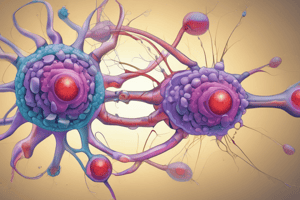Podcast
Questions and Answers
What is a key characteristic of cell signaling that ensures the correct target cells respond to specific signals?
What is a key characteristic of cell signaling that ensures the correct target cells respond to specific signals?
- Feedback Inhibition
- Diversity
- Specificity (correct)
- Desensitization
What term describes the process through which a small amount of signaling molecule can lead to a large cellular response?
What term describes the process through which a small amount of signaling molecule can lead to a large cellular response?
- Amplification (correct)
- Transduction
- Distribution
- Reception
In which form does intercellular signaling primarily occur?
In which form does intercellular signaling primarily occur?
- Paracrine signaling only
- Both endocrine and paracrine signaling (correct)
- Endocrine signaling only
- Direct cell-to-cell contact
Hormones are synthesized through various pathways, primarily within which cell organelle?
Hormones are synthesized through various pathways, primarily within which cell organelle?
What is NOT a characteristic of cell signaling?
What is NOT a characteristic of cell signaling?
Which form of intercellular signaling involves direct cell contact?
Which form of intercellular signaling involves direct cell contact?
What characterizes signal amplification in cellular signaling?
What characterizes signal amplification in cellular signaling?
How are steroid hormones primarily synthesized?
How are steroid hormones primarily synthesized?
Which type of cell organelle is abundant in cells that secrete peptide hormones?
Which type of cell organelle is abundant in cells that secrete peptide hormones?
Which of the following hormones acts through a nuclear receptor to regulate gene transcription?
Which of the following hormones acts through a nuclear receptor to regulate gene transcription?
What is a distinctive function of the thyroid hormone triiodothyronine (T3)?
What is a distinctive function of the thyroid hormone triiodothyronine (T3)?
What are the main components of a nuclear receptor?
What are the main components of a nuclear receptor?
What type of hormones are progestogens classified as?
What type of hormones are progestogens classified as?
Which type of receptor primarily functions in protein phosphorylation?
Which type of receptor primarily functions in protein phosphorylation?
What is one of the main functions of intra-cellular signaling complexes?
What is one of the main functions of intra-cellular signaling complexes?
What physiological process is mediated by either hyperpolarization or depolarization?
What physiological process is mediated by either hyperpolarization or depolarization?
Which of the following appropriately describes the characteristic timescale of signal transduction via growth factor receptors?
Which of the following appropriately describes the characteristic timescale of signal transduction via growth factor receptors?
What is the primary role of signaling molecules in intercellular communication?
What is the primary role of signaling molecules in intercellular communication?
Which process is characterized by the addition of a phosphate group to a molecule?
Which process is characterized by the addition of a phosphate group to a molecule?
Which type of receptor is typically associated with kinases?
Which type of receptor is typically associated with kinases?
What differentiates hormone synthesis pathways in cells?
What differentiates hormone synthesis pathways in cells?
What aspect of signaling is best illustrated by the term ‘signal amplification’?
What aspect of signaling is best illustrated by the term ‘signal amplification’?
Which type of receptor is associated with GABAA receptors?
Which type of receptor is associated with GABAA receptors?
What is the role of Gq proteins in cell signaling?
What is the role of Gq proteins in cell signaling?
Which of the following hormone receptors is Gs protein coupled?
Which of the following hormone receptors is Gs protein coupled?
Which substance is increased by TSH to elevate thyroxine production?
Which substance is increased by TSH to elevate thyroxine production?
How do α2-adrenergic receptors primarily affect adenylate cyclase?
How do α2-adrenergic receptors primarily affect adenylate cyclase?
Which intercellular signaling form is mediated by ligand-gated ion channels?
Which intercellular signaling form is mediated by ligand-gated ion channels?
Which of the following is a feature of signal amplification in hormone signaling?
Which of the following is a feature of signal amplification in hormone signaling?
What is the transient effect of TSH on thyroxine synthesis mediated by?
What is the transient effect of TSH on thyroxine synthesis mediated by?
Which G protein is associated with α1-adrenergic receptors?
Which G protein is associated with α1-adrenergic receptors?
Which of the following is a common function of G protein coupled receptors?
Which of the following is a common function of G protein coupled receptors?
What role do scaffold proteins play in intracellular signaling?
What role do scaffold proteins play in intracellular signaling?
What effect does positive feedback have in signaling pathways?
What effect does positive feedback have in signaling pathways?
During insulin signaling, what is the initial event triggered by ligand binding?
During insulin signaling, what is the initial event triggered by ligand binding?
How do negative feedback mechanisms affect signaling output?
How do negative feedback mechanisms affect signaling output?
What is desensitization in pharmacology?
What is desensitization in pharmacology?
What happens during the phosphorylation events in signaling pathways?
What happens during the phosphorylation events in signaling pathways?
Which of the following best describes the complexity of intercellular signaling?
Which of the following best describes the complexity of intercellular signaling?
Which of the following is NOT a type of feedback mentioned in signaling?
Which of the following is NOT a type of feedback mentioned in signaling?
What characteristic is true of a heterotetrameric insulin receptor?
What characteristic is true of a heterotetrameric insulin receptor?
Which of the following processes reflects signal amplification in cell signaling?
Which of the following processes reflects signal amplification in cell signaling?
Study Notes
Four Forms of Intercellular Signalling
- Juxtacrine: Contact-dependent
- Paracrine: Can be autocrine
- Synaptic
- Endocrine
Hormones
- Proteins: Adrenocorticotrophin
- Glycosylated: Thyroid-stimulating hormone
- Dimerized: Follicle-stimulating hormone
- Peptides: Vasopressin
- Monoamines: Norepinephrine
- Amino Acid Derivatives: Melatonin
- Steroids: Cortisol
- Lipids: Prostaglandins
Receptor Locations
- Most Hormone Receptors are found on the cell membrane.
- Some receptors are located in the nucleus.
Hormone Synthesis
- Proteins and peptides: Classic DNA-mRNA-protein route
- Lipid-based hormones: Synthesis occurs through precursors like cholesterol.
Cell Organelles and Hormone Synthesis
- Steroid hormone-secreting cells: Contain abundant smooth endoplasmic reticulum (SER)
- Peptide hormone-secreting cells: Contain abundant rough endoplasmic reticulum (RER)
Examples of Peptide Hormone-Secreting Cells
- α Cells: Secrete glucagon
- β Cells: Secrete insulin
Reception
- Most ligands: Steroid hormones, thyroid hormones
Slow and Fast Responses
Nuclear Receptors
- Located in the nucleus or cytoplasm
- Regulate gene transcription
- Usually have three distinct domains:
- Ligand-Binding Domain
- DNA-Binding Domain
- Activation Function Domain(s)
- Bind to steroids and lipid-based ligands
- Exceptions:
- Triiodothyronine (T3)
- Oestrogen
Steroid Receptors
- Prototypical cortisol receptor: Exists as cytoplasmic, multimeric complexes with Heat Shock Proteins (HSP) under basal conditions.
- Association of the steroid ligand with the receptor results in dissociation of the HSP, leading to nuclear translocation of the receptor.
- Binds to specific DNA elements (HRE), supported/determined by enhancer elements.
- May repress transcription by binding to other transcription factors.
Triiodothyronine Signalling
- Acts on gene regulation, both nuclear and mitochondrial genes.
- Binds to thyroid receptor (TR) and recruits coactivators.
Major Classes of Cell Surface Receptors
- Ligand-gated ion channels: E.g., GABAA receptors
- G protein-coupled receptors: E.g., GABAB receptors
- Serotonin and acetylcholine receptors: Have both ligand-gated ion channel and G-coupled receptors.
Three Different G Proteins
- Gs proteins: Stimulate adenylate cyclase (increase cAMP), examples include β-adrenergic receptors and ACTH receptor.
- Gi proteins: Inhibit adenylate cyclase (decrease cAMP), examples include α2-adrenergic receptors and M2 muscarinic receptors.
- Gq proteins: Activate phospholipase C (increase PKC, increase intracellular Ca2+), examples include α1-adrenergic receptors and M1 muscarinic receptors.
Adrenergic Receptors
- Group of G-coupled receptors
- Subgroups:
- Alpha receptors:
- α1: Gq protein coupled
- α2: Gi protein coupled
- Beta receptors:
- β1, β2, β3: All Gs coupled
- Alpha receptors:
TSH Signalling
- TSH causes increased synthesis and secretion of thyroxine.
- Has a transient effect via diacylglycerol (DAG) and a persistent effect via cAMP.
Activation, Deactivation and Signal Passing
- Molecular switches are involved in signal relay.
Complexity of the System
- Intracellular signalling complexes enhance the speed, efficiency, and specificity of the response.
Feedback
- Positive feedback can generate an All-or-None response.
- Positive feedback is when the output stimulates its own production.
- Negative feedback inhibits its own production, limiting the level of response.
- Negative feedback can adjust sensitivity to a signal.
Desensitization
- Desensitization is the reduction of activity of a drug target in response to a drug.
- Insulin signalling involves a heterotetrameric insulin receptor.
- Insulin signalling leads to activation of intrinsic tyrosine kinase and tyrosine phosphorylation.
- Insulin signalling involves associated proteins (IRS 1-4) that bind and get phosphorylated.
Enzyme-Coupled Receptors
- Enzyme-coupled receptors: Function as or associate with enzymes (often kinases).
- Examples: Growth Factor Receptor, Insulin receptor, Ephrin, Cytokine receptors.
Cell Signalling Learning Outcomes
- Describe the principles of cell signalling.
Reading List
- "Essential Cell Biology" by Alberts et al.
Principles of Cell Signalling
- Reception: Detect the signal.
- Transduction: Convert the signal into a form that can elicit a cellular response.
- Response: Specific cellular action in response to the signal.
Characteristics of Signalling
- Specificity: Signals must be specific for their target receptors and elicit the appropriate response.
- Amplification: Signals can be amplified by enzyme cascades, increasing the magnitude of the response.
- Network: Signalling pathways are interconnected, allowing for complex control and integration of cellular processes.
- Modularity: Signalling pathways can be assembled from common components, allowing for flexibility and adaptability.
Studying That Suits You
Use AI to generate personalized quizzes and flashcards to suit your learning preferences.
Related Documents
Description
Explore the four forms of intercellular signaling, including juxtacrine, paracrine, synaptic, and endocrine. Understand the various types of hormones, their structures, and the locations of hormone receptors. Delve into the synthesis of hormones and the role of cell organelles in hormone production.




